

Maundy Thursday. HOLY THRUSDAY. HOLY THRUSDAY. Easter. The last week of Lent is called Holy Week, and it contains the days of the Easter Triduum, including Maundy Thursday (also known as Holy Thursday), commemorating the Last Supper and its preceding foot washing,[8][9] as well as Good Friday, commemorating the crucifixion and death of Jesus.[10] Easter is followed by a fifty-day period called Eastertide, or the Easter Season, ending with Pentecost Sunday.
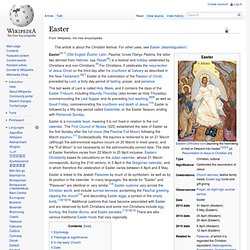
Easter is a moveable feast, meaning it is not fixed in relation to the civil calendar. The Sacred Triduum: Holy Thursday, Good Friday and Easter. The Mystery of Faith - Easter / Lent. "Beginning with the Easter Triduum as its source of light, the new age of the Resurrection fills the whole liturgical year with its brilliance.
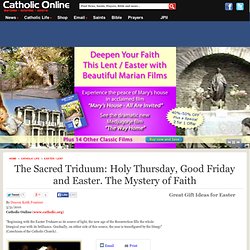
Gradually, on either side of this source, the year is transfigured by the liturgy" (Catechism of the Catholic Church) . CHESAPEAKE, VA (Catholic Online) – The Easter Triduum begins with the Vigil of Holy Thursday. It marks the end of the forty days of Lent and the beginning of the three-day celebration of the death and resurrection of Jesus Christ - Holy Thursday, Good Friday and Easter Vigil/Easter Sunday. The Fathers of the Second Vatican Council reminded us of the extraordinary significance of the Triduum : "Christ redeemed us all and gave perfect glory to God principally through his paschal mystery: dying he destroyed our death and rising he restored our life. Paschal Triduum. Since the 1955 reform by Pope Pius XII, the Easter Triduum, including as it does Easter Sunday, has been more clearly distinguished as a separate liturgical period.
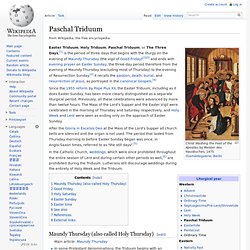
Previously, all these celebrations were advanced by more than twelve hours. The Mass of the Lord's Supper and the Easter Vigil were celebrated in the morning of Thursday and Saturday respectively, and Holy Week and Lent were seen as ending only on the approach of Easter Sunday. After the Gloria in Excelsis Deo at the Mass of the Lord's Supper all church bells are silenced and the organ is not used. The period that lasted from Thursday morning to before Easter Sunday began was once, in Anglo-Saxon times, referred to as "the still days".[5] In the Catholic Church, weddings, which were once prohibited throughout the entire season of Lent and during certain other periods as well,[6] are prohibited during the Triduum.
Maundy Thursday (also called Holy Thursday)[edit] Good Friday[edit] Holy Saturday[edit] Lent. Its institutional purpose is heightened in the annual commemoration of Holy Week, marking the death, burial and resurrection of Jesus, which recalls the tradition and events of the New Testament beginning on Friday of Sorrows, further climaxing on Jesus' crucifixion on Good Friday, which ultimately culminates in the joyful celebration on Easter Sunday of the Resurrection of Jesus Christ.
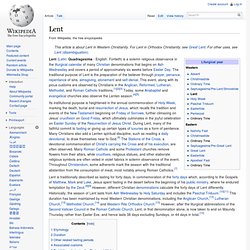
During Lent, many of the faithful commit to fasting or giving up certain types of luxuries as a form of penitence. Many Christians also add a Lenten spiritual discipline, such as reading a daily devotional, to draw themselves near to God.[6] The Stations of the Cross, a devotional commemoration of Christ's carrying the Cross and of his execution, are often observed. Many Roman Catholic and some Protestant churches remove flowers from their altars, while crucifixes, religious statues, and other elaborate religious symbols are often veiled in violet fabrics in solemn observance of the event. Lent. Good Friday. Good Friday is a religious holiday, observed primarily by Christians, commemorating the crucifixion of Jesus Christ and his death at Calvary.
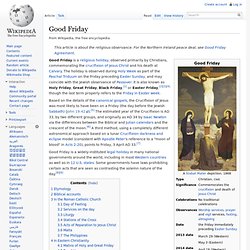
The holiday is observed during Holy Week as part of the Paschal Triduum on the Friday preceding Easter Sunday, and may coincide with the Jewish observance of Passover. It is also known as Holy Friday, Great Friday, Black Friday,[1] or Easter Friday,[2][3][4] though the last term properly refers to the Friday in Easter week. Good Friday is a widely-instituted legal holiday in many national governments around the world, including in most Western countries as well as in 12 U.S. states. Some governments have laws prohibiting certain acts that are seen as contrasting the solemn nature of the day.[8][9] Etymology[edit] The etymology of the term "good" in the context of Good Friday is contested. Biblical accounts[edit] Conflicting testimony against Jesus was brought forth by many witnesses, to which Jesus answered nothing.
Good Friday.